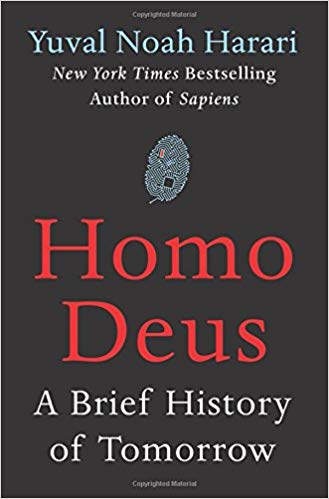You have /5 articles left.
Sign up for a free account or log in.
 Homo Deus: A Brief History of Tomorrow by Yuval Noah Harari
Homo Deus: A Brief History of Tomorrow by Yuval Noah Harari
Published in February of 2017.
Vacations are all about reading fiction.
Last week at the beach I raced through Winslow’s The Border (definitely read the trilogy) and Forsyth’s The Fox (mindless fun).
Then my Kindle ran dry. My solution: Yuval Noah Harari.
Having read and thoroughly enjoyed Sapiens, it was basically predestined that I would read Homo Deus.
Harari would argue that Amazon’s AI knew before I did that I would purchase Homo Deus (the e-book and audiobook version). In the future, if Harari is right, Amazon will not even wait for me to make the purchase. The book will be purchased for me, as Amazon’s AI talks to my AI (or maybe they are the same thing), eliminating whatever minimal friction remains in digital consumerism.
Homo Deus is the perfect spring break book. It is no more intellectually taxing than The Border or The Fox. The facts, theories, trends, ideas, and prognostications of Homo Deus can be ingested as easily as a Pina Colada.
This is a book that makes you feel smart for its reading but does not leave the reader any smarter. I say this with affection. Crime and spy novels, if they are any good, are built to entertain. Same with Homo Deus.
The book avoids asking the reader to struggle with any difficult issues such as the future of economic inequality, the effects of climate change, or technologically driven unemployment.
Instead, Harari has lots of interesting things to say about how "organisms are algorithms and life is data processing,” and why “intelligence is decoupling from consciousness,” and our resulting future where “non-conscious but highly intelligent algorithms may soon know us better than we know ourselves."
What all this means is that, as usual, we are all worrying about the wrong things.
I worry about wealth concentration, rapidly following fertility, climate change, and public disinvestment from human and physical infrastructure.
Harari would say that I should worry more about what will happen not when the 9.9 percent succeed in privatizing all of public life, but when this same class fully integrates with the Amazon/Google/Facebook/Tencent/Baidu/Alibaba/Microsoft/IBM/Apple AI.
Having read Sapiens and Homo Deus back-to-back, I’m tempted to believe that Yuval Noah Harari is himself a general-purpose artificial intelligence. If an AI was going to write a book to justify human belief in letting algorithms run our life, this is the book that it would write.
Sapiens is a much better book than Homo Deus. Sapiens demonstrates an astounding breadth of knowledge, and the ability to synthesize on a massive scale. Homo Deus reads more like a book that an astoundingly smart person would write if they never wanted to leave their office, and had access to both Google and a great set of academic library databases.
Being someone who would like never to leave his office, and who has a fast campus internet connection and full access to one of the world’s best academic libraries, I thoroughly admire Hariri’s writing process. Homo Deus is like the world’s best blog in book format. However, anyone who reads blogs knows that this is not high praise.
The classic mistake that the historian Harari makes when writing about technology is to gravitate to extreme conclusions. Anyone who works with technology knows how kludgy and limited our tools remain.
AI may be improving rapidly, but the technologies maturation will no more eliminate the importance of politics or culture than the revolutionary technologies of the last century.
For the fiction loving vacationer, Homo Deus will be hard to top.
What are you reading?




